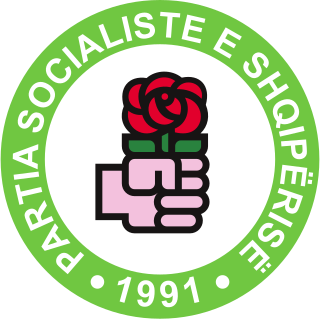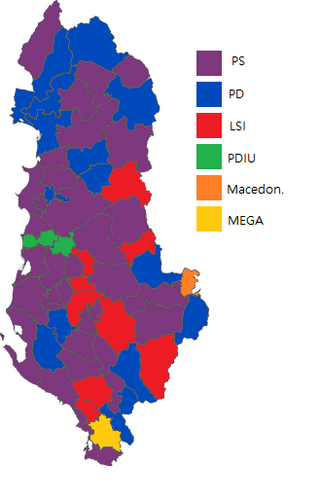
Edi Rama is an Albanian politician and painter who has been serving as the 33rd and incumbent prime minister of Albania since 2013 and chairman of the Socialist Party of Albania since 2005. He was Minister of Culture, Youth and Sports from 1998 to 2000. First elected mayor of Tirana in 2000, he was reelected in 2003 and 2007.

Fatos Thanas Nano is an Albanian socialist politician who served as Prime Minister of Albania in 1991, from 1997 to 1998 and from 2002 to 2005. He was the first leader and founder of the Socialist Party of Albania and a member of the Albanian Parliament from 1991 to 1993 and 1997 to 2009. He reformed the anti-revisionist Marxist-Leninist ideology of the Labor Party of Albania into social democracy for its successor, the Socialist Party. During his leadership, the Socialist Party, as a result of reforms, joined the Socialist International and Party of European Socialists. Nano was a candidate in the 2007 presidential election but did not win. He again tried in the 2012 presidential election, but he did not even qualify as a candidate, because the leaders of parties in Parliament obstructed their respective MPs to elect him as candidate in the elections.

The Socialist Party of Albania is a social-democratic political party in Albania. It has been described as centre-left. It is the inheriting force of the Communist Party of Albania, which was founded on 8 November 1941 and later became known as the Party of Labour of Albania. After the fall of communism in Albania, the Party of Labour of Albania rebranded itself as the Socialist Party of Albania in an effort to adapt to the new political landscape. This is the reason why the Socialist Party is claimed to have been founded on 13 June 1991. The PS is an associate of the Party of European Socialists and a member of the Socialist International, and it claims to hold pro-European views.

The Democratic Party of Albania is a conservative political party in Albania. It has been the largest opposition party in the country since 2013.

Lulzim Basha is an Albanian lawyer and politician who served as chairman of the Democratic Party of Albania and as the Leader of the Opposition from 2013 to 2022 and again from 2023 until 2024.

The fall of communism in Albania, the last such event in Europe outside the Soviet Union, started in December 1990 with student demonstrations in the capital, Tirana, although protests started in January that year in other cities like Shkodër and Kavajë. The Central Committee of the communist Party of Labour of Albania allowed political pluralism on 11 December and the largest opposition party, the Democratic Party, was founded the next day. March 1991 elections left the Party of Labour in power, but a general strike and urban opposition led to the formation of a "stability government" that included non-communists. Albania's former communists were routed in elections in March 1992 amid economic collapse and social unrest, with the Democratic Party winning most seats and its party head, Sali Berisha, becoming president.
In 1991, the Socialist Party of Albania, with specific social democratic ideology took control of the country through democratic elections. One year later the Democratic Party of Albania won the new elections. After 1990, Albania has been seeking a closer relationship with the West. What followed were deliberate programs of economic and democratic reform, but the implementation of capitalism led to the proliferation of pyramid schemes. Chaos in late 1996 to early 1997, as a result of the collapse of these pyramid schemes, alarmed the world and prompted the influx of international peacekeeping forces. In 1995, Albania was accepted into the Council of Europe and requested membership in NATO and is a potential candidate country for accession to the European Union. The workforce of Albania has continued to emigrate to Western countries, especially Greece and Italy.

The Albanian local elections of 2011 took place on 8 May 2011 in Albania. Electors were asked to elect their municipality's mayor, municipal council members, municipal unit mayor, and municipal unit members. The elections were administrated by the Central Election Commission of Albania. Only 9 of the 384 winning candidates were women.

The Municipal Council of Tirana is the legislative body of Tirana, Albania. As of 2019 it consists of 61 members who serve a 4-year term. The members of the council are elected in local elections and the last elections were won by the Socialist Party. The member of the council elects the Chairman of the council. During the 2019–2021 Albanian political crisis members from the opposition had boycotted the election. Which resulted in a Socialist Party landslide. Around the split of the opposition Democratic Party of Albania many democrats would join Together We Win coalition.

Arben Ahmetaj is an Albanian former politician who served as the Deputy Prime Minister of Albania from 2021 to 2022. Since 2013 previously has served in several important departments such as: Minister of Economic Development, Minister of Finance, as well as Minister of State for Reconstruction after the devastating earthquake in 2019 that occurred in the central area of the country.
The Albanian local elections in 1992 was the first local election held in Albania. The elections were held on 26 July 1992 and the general winner was the coalition Socialist Party of Albania with 49.87% of the vote. The Democratic Party of Albania however, won in capital of Tirana.

Local elections were held in Albania on 21 June 2015. Voters elected mayors, municipal council members, municipal unit mayors and municipal unit members. The Central Election Commission of Albania was responsible for administrating the elections. This provided that the community type of komuna was abolished and at the same time the total number of communities were reduced from 373 to 61 Bashkia. Those entitled to vote elected the executive and legislative representatives of their communities, the 61 mayors (and on the other hand the total of 1595 municipal councils.
The following lists events that happened during 2004 in Republic of Albania.

Parliamentary elections were held in Albania on 25 June. They had initially been scheduled for 18 June, but after a possible boycott was announced by opposition parties during a political crisis that lasted three months, an agreement was reached between all parties on 18 May to change the date. The Socialist Party won 74 of the 140 seats.

The 2017 Albanian opposition protests were a series of anti-government protests, largely in Tirana, which centered around poverty, corruption, the illicit drug situation in Albania, fear of electoral fraud in the parliamentary elections, and alleged manipulation of the voting process by the government.

Parliamentary elections were held in Albania on 25 April 2021 amid the COVID-19 pandemic to elect the 140 members of the parliament. A total of 1,871 candidates, including 732 women, were registered, with ten political parties, two coalitions and three independent candidates contesting the election. The Socialist Party (PS), led by incumbent Prime Minister Edi Rama, opted for an independent participation, while the opposition Democratic Party (PD), under Lulzim Basha, formed the Democratic Party – Alliance for Change, a coalition with 12 smaller parties. Other notable political entities, including the Socialist Movement for Integration (LSI) and the Social Democratic Party (PSD), also pursued electoral success independently. The election campaign was highly polarised, with competing narratives centered on pressing national issues such as European Union (EU) accession, economic development, healthcare reform, infrastructure modernisation, and the government's handling of the COVID-19 crisis. Campaign strategies were significantly altered due to the pandemic, with political parties increasingly relying on digital platforms and social media to reach voters, as traditional in-person events were limited by public health restrictions.
Parliamentary elections are scheduled to be held in Albania on 11 May 2025 to elect the 140 members of parliament.

Local elections were held on 14 May 2023 in Albania. Mayors and municipal council seats were being elected in each of Albania's 61 municipalities.
Events in the year 2023 in Albania.
Parliamentary elections are scheduled to be held in Kosovo on 9 February 2025 to elect the 120 members of the Assembly.













